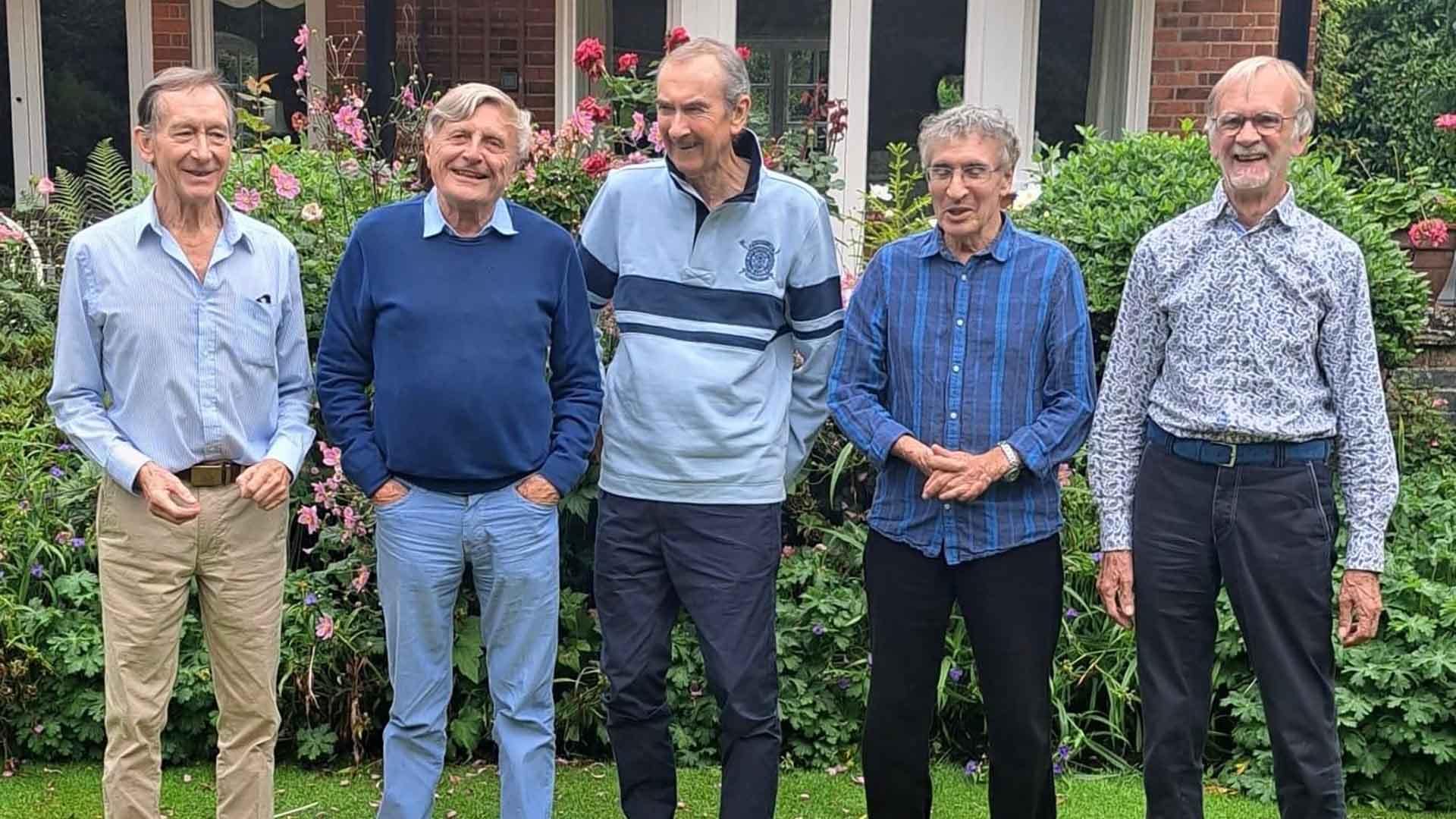Class of 1968 Electrical Engineering graduates celebrate almost 60 years of friendship

Former classmates Sir Robin Saxby, Bruce Thomas, Ray Northcott, John McMillan and Peter Berger forged their friendships at Liverpool in the mid-1960s and have remained close friends ever since.
Following their graduation from the Department of Electrical Engineering and Electronics, Robin, Bruce, Ray, John and Peter went on to have varied careers that would see many of them travel the world. Despite this, they’ve kept in regular contact and still meet up frequently to reminisce about their time at Liverpool. They’ve kindly shared a few words with us about their lives and careers following their graduation.
Sir Robin Saxby
Sir Robin Saxby is a technology entrepreneur who served as founding Chairman, President and Chief Executive of ARM Holdings plc, the world's leading semiconductor intellectual property company, prior to his retirement in 2007. He is also a visiting professor at the University’s Department of Electrical Engineering and Electronics and a long-standing supporter of the University.
Robin is in a band with his son Neil who plays the bass guitar. They produced a track about Robin’s memories of being a student in the 1960s post-war Liverpool. He recalls living in Roscoe Hall with central heating, the music of the city and founding friendships with his classmates.
You can listen to his track here:
Bruce Thomas
Bruce shared his career journey, explaining that he, “worked as a Planning Engineer with CEGB and then RTZ until 1973 when I switched to Production Management with Mars followed by Croda International. In 10 years at Croda I moved to general management, becoming MD of their International Commodity company. In 1986 joined FDL, a large private Commodity company as MD until retirement in 2006.
I have kept in regular contact with my Liverpool classmates and after nearly 60 years regard them all as close friends.”
Ray Northcott
Ray recalled starting his career pre-Internet, he said, “When I graduated in 1968, it was some 15 years before the birth of the Internet. Business enterprises of all sizes and both public sector and private therefore needed private telecommunications networks to link computer systems at many sites. The focus on network design and implementation was my work for some 14 years following my graduation in electronic engineering. This developed into IT Strategy work and delivering competitive advantage through IT. My work took me to many countries across Europe and one project in Indonesia designing a data communications network for the government there. I also worked in the USA in 1985/86 leading a telecommunications team there which had been losing money! By the time I left they were making a small profit.”
John McMillan
John told us about his career that had seen him take on many positions across the UK, he said he, “Started work for STC designing controls for power stations. After a year I joined the Greater London Council team that computerised London's traffic signals. I joined ICL in 1975, developing applications for stock control, order processing and building societies. When personal computers emerged in the late 1970s, I set up my own company to work with PCs and left ICL in 1980. Within 2 years I was back as a consultant to help launch the ICL PC and other new technologies, especially into the UK government. I ran my company until retirement, ending my career with a project for BT on standards for the Internet of Things and smart cities. In 1985 I relocated to Suffolk and became president of the Sudbury chamber of commerce, staying as a senior officer until 2023.”
Peter Berger
Peter’s recalls how his career reflects the changes in the field of electrical engineering over the past 50 years, he said, “following my graduation in Electronic Engineering in 1968, my career in electronics has been mainly in the research and development field. After graduation I worked as a hardware engineer in the defence industry at Marconi on sonar towed arrays, which involved sea trials in the North sea and the Bay of Biscay. My next employment was at EMI working on infrared detectors for heat cameras and laser ranging. Electronic Circuit design at this time was mainly analogue, using discrete transistors.
“Since then I have worked at various automotive and consumer companies, moving from analogue to digital solutions. I used early silicon logic integrated circuits, then progressed to systems with complex memory and microprocessor devices. These 'computer chips' required embedded software to control stand-alone systems, and I acquired programming skills to take on roles as a software engineer.
With experience in many electronics applications, highlights have included working at McLaren on F1 racing car engine injection control. Also I had roles at Intel in Germany and Ericsson in Sweden on early smart phone development. Electronic engineering has probably changed more rapidly over my career than other engineering disciplines. Anyone entering this field should be prepared for constant retraining and sharp learning curves.”
Thanks to Robin, Bruce, Ray, John and Peter for sharing their stories with us. If you would like to share your reunion story, please get in touch with us at: alumni@liverpool.ac.uk.